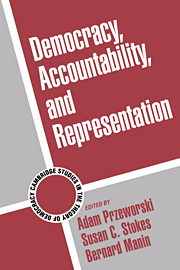Book contents
- Frontmatter
- Contents
- List of Contributors
- Introduction
- Part One Elections, Accountability, and Representation
- 1 Elections and Representation
- 2 Electoral Accountability and the Control of Politicians: Selecting Good Types versus Sanctioning Poor Performance
- 3 What Do Policy Switches Tell Us about Democracy?
- 4 Accountability and Authority: Toward a Theory of Political Accountability
- 5 Accountability and Manipulation
- 6 Party Government and Responsiveness
- 7 Democracy, Elections, and Accountability for Economic Outcomes
- Part Two The Structure of Government and Accountability
- Part Three Overview
- Author Index
- Subject Index
3 - What Do Policy Switches Tell Us about Democracy?
Published online by Cambridge University Press: 05 June 2012
- Frontmatter
- Contents
- List of Contributors
- Introduction
- Part One Elections, Accountability, and Representation
- 1 Elections and Representation
- 2 Electoral Accountability and the Control of Politicians: Selecting Good Types versus Sanctioning Poor Performance
- 3 What Do Policy Switches Tell Us about Democracy?
- 4 Accountability and Authority: Toward a Theory of Political Accountability
- 5 Accountability and Manipulation
- 6 Party Government and Responsiveness
- 7 Democracy, Elections, and Accountability for Economic Outcomes
- Part Two The Structure of Government and Accountability
- Part Three Overview
- Author Index
- Subject Index
Summary
Carlos Menem was the presidential candidate of the Peronist party in Argentina in 1989. The economic context was bad: inflation was high (although hyperinflation would not break out until after the election), and the government's hard currency holdings were perilously low. The incumbent government of Raúl Alfonsín, of the Radical Party, attempted numerous emergency plans to stabilize prices and reduce the government's current account deficit.
Menem's campaign called for stabilizing the economy without imposing hardships on workers or the middle class. A book he and his running mate coauthored during the campaign called for a revolución productiva, or productive revolution (Menem and Duhalde 1989). With mildly expansionary policies to exploit unused industrial capacity, Argentina would overcome depressed real wages, high unemployment, and price instability. At the very moment when the incumbent Alfonsín government was imposing austerity measures and currency devaluations – called paquetazos – Menem on the campaign trail invented the term salariazo, a big upward shock to wages. Consistent with the Peronist tradition, Menem championed a development model that included state ownership of heavy industry, utilities, and oil. Also consistent with the Peronist tradition, he expressed distrust of Argentina's export bourgeoisie, epitomized by the conglomerate Bunge y Born. Early in the campaign Menem called for a moratorium on payments of Argentina's foreign debt, although he later moderated that position with a call for a five-year cessation of repayment and renegotiation on terms favorable to Argentina. Finally, he warned Britain that blood might again flow in the Malvinas, or Falkland Islands.
- Type
- Chapter
- Information
- Democracy, Accountability, and Representation , pp. 98 - 130Publisher: Cambridge University PressPrint publication year: 1999
- 59
- Cited by

